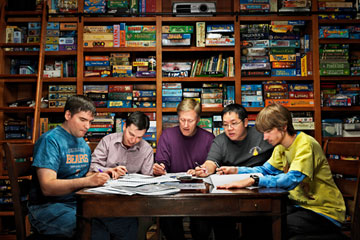
(3 of 7)
The team's current reigning powerhouse is Thomas Snyder, 33, a rapid talker with boyish sticky-up hair and a quick smile that alternates with a perennially worried expression. Snyder has been the U.S. puzzle champion six times, and he's generally acknowledged to be one of the top two or three puzzle solvers in the world. Atypically for competitors at this level, he has a serious career outside puzzles: he has a Ph.D. in chemistry from Harvard, and he was, until recently, the lead scientist at a biotech firm called ImmuMetrix. "What I'm very good at is observation puzzles," he says. "You've got a grid with tons of numbers, but you've got to pick out the few that are critical to see and use them. It's sort of what I do in my day-to-day job as a scientist. I look through gigabytes of data and find the few pieces that are relevant." There are those who think the distraction of attempting to solve the world's immunological woes is why Snyder is the puzzling world's Ahab: for all his success, he has never won the individual world championship. It's something of an obsession.
Rounding out the A team are Jonathan Rivet, 37, an affable computer programmer from Chicago, and Palmer Mebane, the team's prodigy. He's only 23, but Mebane--who by day works for a website for advanced math students called Art of Problem Solving--has already done something Snyder hasn't: at the 2011 WPC in Hungary he stunned the puzzling world by winning the whole shooting match, defeating even the German juggernaut Ulrich Voigt, who has won it more times than anyone else. (Snyder came in third; Huang was fourth.) Mebane is intense, jittery and as skinny as an addict. Which he is, though drugs are not his addiction. "I'm a pretty introverted person," he says, "so math and puzzles are pretty much all I do in life."
Pure Logic
The word puzzle means a lot of different things to a lot of different people. Take sudoku, for example. It's generally believed to have been invented, at least in its modern form, in 1979 by Howard Garns, a retired architect from Indiana, who called it Number Place. It got renamed sudoku in Japan in the 1980s, and then it spread back to the West via the London Times in 2004, at which point its popularity exploded--it's the kudzu of the puzzling world. There's a World Sudoku Championship, which is generally held right before the WPC and in the same venue. Snyder has won it three times, though he sat it out in 2012 to save his strength for the WPC.
WPC puzzles are different. They're pure-logic problems. The principles involved are simple. There's no trigonometry, no higher math. The goal is to test reasoning power, not knowledge. "What's great about it is, you don't need a Ph.D. in math," says Todd Geldon, who played for the B team in Kraljevica (and who does, as it happens, have a Ph.D. in math). "It's very accessible in terms of what you're looking at, what the rules are, what the goals are. But actually doing it is very difficult."
